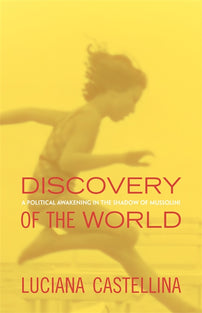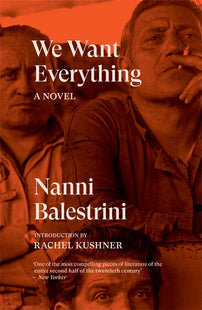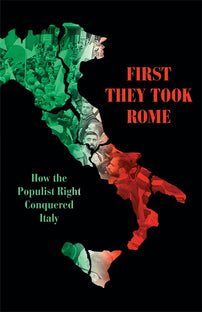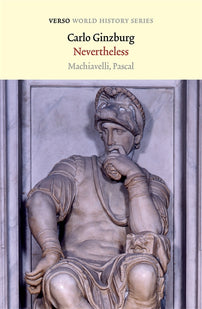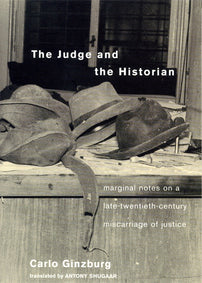Natalia Ginzburg's politics
Recent years have seen a renewed appreciation of the writing of the post-War Italian novelist Natalia Ginzburg, not least her celebrated books Family Lexicon, All Our Yesterdays and The Dry Heart. Yet, missing in the reading of her work as the laureate of unfulfilling marriages, thwarted relationships and tangled families is both their political context and Ginzburg's fierce commitment to emancipatory politics.

“It’s true.” sighs Lidia Levy in Natalia Ginzburg’s autobiographical novel Family Lexicon, “If Stalin came to take away my maid, I’d kill him”. In the book, initially published in Italian in 1963 and newly translated into English by Jenny McPhee in 2017, the familial and the political are interwoven. Lidia and Giuseppe Levy, Ginzburg’s parents offer numerous pithy comments throughout. “I forbid you to discuss politics with the servants!”, she says, and “I seem bourgeois to him because I keep the closets neat”. What we are left with is an image of family life where anti-fascism and left-wing politics are prevalent, but not pressing.
Ginzburg also describes the family’s delight when one of her brothers is arrested for anti-fascist activism (“My father was, however, thrilled to have a conspirator for a son”), their numerous political jokes (“the only little gags [Ginzburg’s father] had tolerance for were anti-fascist ones”), and a remarkably light-hearted approach to the perilous task of sheltering enemies of the fascist state during Mussolini’s Italy. Yet, this autobiographical story of Ginzburg’s large family and its war-time life is often read as less a political novel than a novel with a political background — a Nancy Mitford-esque coming of age story, with a bit of added anti-fascism.
For contemporary English readers, Ginzburg is the laureate of unfulfilling marriages and thwarted relationships (Voices in the Evening, The Dry Heart, and The Road to the City), unwanted pregnancies (All Our Yesterdays and, again, The Road to the City), and complicated, tangled families (Happiness as Such, Family Lexicon, and All Our Yesterdays). Above all, she is the painstaking chronicler of provincial wartime and post-war Italy: a world where it is “easy to distinguish the poor from the rich by their fires”, where “women … lose their teeth at thirty, from hard work and poor nutrition”, and dysentery, lice, and poverty are as widespread as the gossip and chatter she made it her craft to record.
In reviews and essays, she is remembered for her brilliance — Sally Rooney calls All Our Yesterdays a “perfect novel” — but also for a curious distance from politics. Tim Parks, in an essay for the London Review of Books, castigates Ginzburg’s novel Family Lexicon for saying “nothing about fascism, the resistance, Jewishness or anti-Semitism”. For him, Ginzburg “never remotely considers the public life of the people she writes about, or their political views. […] The only things intensely evoked are the relationships between the family members”.
[book-strip index="1" style="buy"]Whilst it might be easy for contemporary readers to draw a line between Ginzburg and her politics, she did not have the luxury of doing so. Born Natalia Levi in 1916 in Palermo, Ginzburg grew up in Turin as the last of five children born to Giuseppe Levi and Lidia Tanzi. Levi — a scientist and professor of anatomy — was Jewish, whilst his wife, Tanzi, was Catholic. Although raised in a secular family, such personal beliefs meant little to Mussolini’s government, or the German soldiers of the Nazi occupation. Ginzburg’s family were avowedly socialist (her father and all three of her brothers spent time in prison for their political beliefs), and the family mixed in a milieu of prominent Italian left-wing thinkers: the feminist revolutionary Anna Kuliscioff, the writer Cesare Pavese, and the Russian Jewish activist Leone Ginzburg.
It was to Leone Ginzburg that Natalia was to eventually fall in love. In Family Lexicon, she describes him as a man with a “precarious” situation — “they could arrest him again and put him in jail” — who wore a too-small coat with a “tattered hat … slightly askew on top of his black hair”. Despite the precarious political situation and threadbare clothes, the pair married. As the war progressed and their family grew (the couple had three children in four years), the Ginzburgs were sent into internal exile in a village in Southern Italy (brilliantly and sparingly recorded in Ginzburg’s essay ‘Winter in the Abruzzi’). Leone returned from exile to Rome to continue publishing his underground newspaper, but was soon caught by the fascist forces. Ginzburg writes, with typical economy, “Leone had died in prison, in the German section of the Regina Coeli prison”.
Ginzburg herself was no stranger to run-ins with the occupying army. After the German invasion of Italy in 1943, Ginzburg — fearful for the fate of Jews, who were being rounded up by the Nazis — escaped in an almost-unprecedently bold manner. In a 1992 interview, she remembered how her landlady told the Germans that she was “a Neapolitan cousin of theirs whose house and possessions — including, of course, all identity papers — had been destroyed by a bomb”. Needing to get to Rome, she “asked the Germans to give me a lift.” “I was taken to Rome with my children in a German military truck!”, she recalled.
Her post-war life was no less political. In 1950, Ginzburg remarried the Catholic intellectual and professor of English Literature Gabriele Baldini and, after three decades at the heart of Italy’s cultural life, including a brief spell in the Italian Communist Party, she was elected to the Italian Parliament on an independent left-wing ticket in 1983.
[book-strip index="2" style="buy"]Given Ginzburg’s life-long saturation in left-wing politics, why is it now so easy to read her fiction entirely divorced from this context? Part of the reason lies with Ginzburg herself: in her writing, she was unfailingly self-deprecating about her own political knowledge, writing in her essay ‘The Invisible Government’ (1972) “there are many people who understand nothing of politics. I am one of them”. In 1987, she recalls being ambivalent about her election to the Parliament, saying “I did not want to accept at first. I did not want to run”. And when she does espouse political beliefs, they are often couched in curiously child-like terms: she describes how, when she was seven years old, “it was explained to me what socialism was … It struck me as something that had to be achieved right away. I found it strange that it hadn’t already been achieved”. Ginzburg’s conception of herself is not all that far from Anna, the heroine of All Our Yesterdays: avowedly revolutionary, with dreams of battling against fascism on the barricades, but with little conception of what it is she is fighting for.
Yet, Ginzburg’s supposed inability to understand politics in 1972 has one essential caveat. She writes: “I must confess that despite understanding nothing of politics, I nonetheless often feel an overpowering temptation to speak of it”. And speak of it she did: in the years after this essay was published, and until her death in 1991, Ginzburg wrote and campaigned on a wide range of political issues, all of which should be remembered alongside her fiction.
As the story of her high-stakes journey with the German army back to Rome shows, Ginzburg — despite her secular upbringing and Catholic relatives — could not easily forget her Jewish identity. She even had to publish her first novel, The Road to the City, under a pseudonym to circumvent the restrictions on publishing for Jews. In an interview in 1991, she spoke about this double identity, saying “I am a Jew.... I'm a Jew only on my father's side, but I've always thought that my Jewish half must be given more weight and remain more troubling than my other half”.
There’s an essay published in 1973, after the massacre at the 1972 Munich Olympics, called ‘Gli ebrei’ (literally “The Jews”), in which Ginzburg discusses what it means to be Jewish. There, she writes of a “secret complicity” when she meets another Jewish person — as well as her criticism of the Zionist rhetoric of the period. Ginzburg writes “sometimes I’ve thought that the Jews of Israel have rights of superiority over others, being survivors of a holocaust”, but then believes this to be an error: “grief and the massacre of innocents … do not give us … any kind of superiority”. There is no escaping her Jewish identity, but still she writes about it from one remove. Her Jewishness — and that of her family, husband, and friends — is scrutinised, probed, and reconstituted in her characteristically precise words. She feels the pull of a group identity — but refutes it just as she asserts it. It is impossible to read Family Lexicon (written in the years after the war had decimated so many Jewish lives) as not, in some way, reflecting this curious duality: her characters are Jewish, and are persecuted for their heritage, but it is their individual foibles, loves, and losses that she prefers to stress.
[book-strip index="3" style="buy"]Alongside her writing on Jewish identity, Ginzburg took up other political causes in the 1970s. In Italy, contraception was prohibited until 1971. Abortion was not legalised until a referendum in 1978 — and Mussolini’s fascist laws made no distinction between contraceptives and abortion. Much of Ginzburg’s fiction deals with children conceived or born out of wedlock (from Anna’s baby in All Our Yesterdays, to Delia’s unfortunate pregnancy in The Road to the City, and the child conceived through an affair in her play The Wig). In All Our Yesterdays, Anna’s feckless boyfriend gives her money to “find a midwife” who could remove the baby, and never writes to her again.
In 1973, Ginzburg took this concern beyond her fiction. In classically understated prose (Ginzburg was not one prone to flashy polemicising), she writes:
I find it hypocritical to affirm that abortion is not killing. Abortion is killing.... But it can't be compared with anything, because it doesn't resemble anything else; it doesn't betray any other right […] To abort means not to suppress another person, but the remote pale design of a person.
It is typical of Ginzburg that, in affirming her belief in something, she manages to make a concession to the other side: little is black-and-white, with considered thought preferred to political soundbites.
In the same period, Ginzburg wrote an essay on feminism in which she wrote “the words ‘Proletarians of the world unite’ I find extremely clear. The words ‘Women of all the world unite’ ring false to me”. For critics who laud Ginzburg as the author of “feminist classics”, this essay poses a difficulty. Ginzburg refutes a difference between men and women (“quantitively, they are the same”), and goes on to write “among the lives of women born in servitude, and the lives of women who are part of privileged society, there isn't the palest connection”. In questioning the basis of feminism (the idea that women are a coherent group), Ginzburg stresses her socialism.
Equivocation and deep consideration characterise Ginzburg’s political thought. She writes what she believes, rather than what might be effective in a campaign. In her earlier essay on her lack of political knowledge, she writes that “expressing oneself politically means thinking and expressing oneself with a specific purpose in mind”. Ginzburg obeys her own dictum. She writes as a means of exploration, and it is the truth, not political change, that she seeks. But, for contemporary English readers, this truth remains inaccessible, not least because her essays on Jewish identity, abortion, and feminism are not available in complete translations.
There was one issue on which Ginzburg expressed herself with a “specific purpose in mind”. In 1989, Italy was shaken by the Serena Cruz adoption case – where a young Philippine girl was taken away from her adoptive parents after a suspected illegality in their paperwork. For Ginzburg — whose essays, novels, and plays stress family life above all else — this was an abomination. Published in 1990, her last book Serena Cruz, or The Meaning of True Justice (also unavailable in a complete English translation) is uncompromisingly political. There, she writes:
Families may be terrible, repressive, obsessive; or indifferent or estranged, or inattentive; or poisonous, corrupt, rotten — they very often are. But children need them. You cannot pluck a child out of one family and plant him in another except for extremely serious reasons. Even so, it will devastate his spirit.
Her belief in the importance of family life spilt over into a theory of government: “The citizens make up the State. It is their absolute right to be assisted by the state when they are in dire need. It is the State’s strict duty to come to their aid … Instead it grinds families to bits”.
It is typical of Ginzburg — the writer whose most famous wartime reminiscences focus on walking her children through the snow and watching them eat rotten oranges — to be at her most political when talking about family life. But, there is something avowedly political, and avowedly anti-sentimental in her domestic writing. For Ginzburg, it was the family that was at the frontier of politics — from wartime oppression, to the daily realities of marriage, divorce, childbirth, and abortion. To deny her this political context is to tragically underestimate and misunderstand her work.
Francesca Peacock is an arts journalist, and is currently working on her first book.
[book-strip index="4" style="display"]
